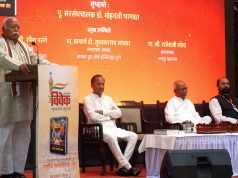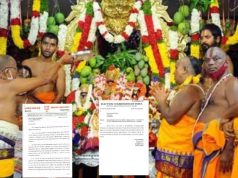
The Citizenship Amendment Act (CAA), National Population Register (NPR) and National Register of Citizens (NRC) are being debated across the country, and rallies are being held for and against the CAA. Some claim that the CAA is against the Constitution and Muslims, while many refute these claims as baseless.
So what is CAA? How is it different from NPR and NRC?
The Basis of CAA
August 1947 brought us both independence as well as partition. The Congress that had earlier vowed to resist Partition under any circumstances, finally buckled under the pressure of Muslim League and consented to the division of the motherland. East and West Pakistan were formed making millions of Hindus and Sikhs minorities and foreigners in their own land. Many of them fled, leaving their land and homes, reaching India as refugees. Millions however, stayed back, assured by repeated promises by leaders like Gandhiji and Nehru that it was India’s responsibility not only to give them protection, but also to ensure that they led their lives with normalcy and dignity. To give some leading examples of such assurances:
- In his speech on 15th August, 1947, Jawaharlal Nehru promised “though our own brothers and sisters who got separated due to political boundaries are unable to share these happy moments with us, they always will be our people, their well-being is our responsibility”.
- On 26th September 1947, Mahatma Gandhi said “’if Hindus and Sikhs living in Pakistan feel that if circumstances there do not allow them to lead peaceful normal lives, they can come to India without any hesitation. Bharat should invite such people”.
- On 25th November 1947, the Congress Working Committee adopted a resolution that stated “Congress is ready to provide protection to all the non-muslims who have fled Pakistan and arrived in India to protect their lives, honor and dignity; we need to provide shelter to all those who would arrive in future also”.
- The then Home Minister Sardar Vallabhbhai Patel assured the refugees from East Pakistan saying that “our own fellow citizens who have made enormous sacrifices in the national freedom movement will not suddenly become foreigners, just because geographical boundaries have changed.”
- Finally, on 15th November 1950, Jawaharlal Nehru declared in his address to the Parliament that “all the people who reached here during partition must be given citizenship. If there are any legal hurdles, we must amend the laws appropriately”.
Continual Violations of Nehru- Liaqat Ali Pact by Pakistan
In April 1950, the Prime Ministers of India and Pakistan, Nehru and Liaqat Ali signed an agreement to ensure, inter alia, protection of minorities in their own countries. They also agreed that:
- Refugees should not be harmed
- Abducted women and looted properties must be returned
- No recognition should be given to forced conversions
- Minority rights must be protected
Pakistan never adhered to this agreement and repeatedly and continually violated it. For instance, PM Liaqat Ali openly prevented the dalits in Pakistan from moving to India, asking the then Indian High Commissioner: `Who will clean the streets and toilets in Karachi if they leave?’
Murder, Conversions and Extermination of Minorities in Pakistan
With increasing religious fanaticism, and as Islam became the state religion of Pakistan and Bangladesh, oppression of and attacks on minorities have become normal and routine. Forced conversions, abduction and kidnapping of minor girls, destruction of religious places like temples and gurudwaras, attacks and murders of minorities on the spurious pretext of `blasphemy’, are daily occurrences. Survival of non-muslims has become precarious and terrifying. Minority population has fallen drastically. Hindu population of Pakistan which was 15% in 1947 fell to 1.6% by 1998. Hindu population of Bangladesh (erstwhile East Pakistan) which was 22% in 1951, dwindled to 9.5% in 2011. Afghanistan faces the same situation. Out of 7.7 lakhs of non-muslims in Afghanistan in 1970, only 7000 survived by 2017. Unable to face extreme oppression and daily harassment, many Hindus from Pakistan and Bangladesh have reached India as refugees. The majority of them are dalits.
Those Who Advocated Shelter and Citizenship to Non-Muslim Refugees have Suddenly Changed Colors
It is Bharat’s responsibility to shelter the non-muslim refugees who are here and are still arriving. Congress leaders have said this several times in the past. On 18th December, 2003, Dr Manmohan Singh, then Leader of Opposition in Rajyasabha, requested the then NDA govt to provide shelter and citizenship to these refugees. Communists who paved the way for Partition by supporting the demand for Pakistan, were also moved by the oppression of non-muslims in Pakistan and Bangladesh. In 2012, CPM General Secretary Prakash Karat wrote to the then PM, Dr Manmohan Singh, requesting that lakhs of religiously persecuted minorities from Bangladesh should be sheltered and that the process of providing citizenship to them should be speeded up. He said that Scheduled castes like Namasudras, Poundra-khatriyas, Majhis etc must be immediately provided with shelter.
It is extremely strange that the same Congress and Communist parties who advocated shelter and citizenship to religiously persecuted non-muslims from across the border are now against CAA which provides for extending citizenship to them. Provoking protests against the Act across the country, these parties now call it unconstitutional, anti-muslim and anti-human rights. They have changed colors overnight, and are raining violence, riots and arson across the country.
What actually is there in the Act?
- Citizenship Amendment Act (CAA)
The Hindu, Sikh, Jain, Buddhist, Parsee, Christian minorities of Pakistan, Bangladesh, Afghanistan, who have entered India before 31st December 2014 would not be considered as illegal infiltrators as per this Act.
- Why was the Citizenship Amendment Act 1955 amended?
Islam is the state religion of Pakistan, Bangladesh and Afghanistan, and hence the Hindu, Sikh, Jain, Buddhist, Parsee and Christian minorities are subjected to attacks and assaults in the name of religion. Fanaticism and mob violence does not let them freely practice their own religion. Many have fled those countries and arrived in India. Majority of the refugees don’t have proper identity papers, and even if they had, they lapsed with time. The 1955 CAA Act had to be amended to recognize the refugees and give them identity. The Amendment allows govt to give citizenship to them immediately under clause 5 of the CAA.
- How many years should the refugees have been residing in India to get citizenship?
The minorities of the above mentioned three countries should have been residing in India, and should be able to provide evidence of their Residentship for at least five years in order to become eligible for citizenship (earlier it was 11 years) under the `naturalization’ process.
- Are these amendments anti-muslim?
NO. The amendments are applicable only to the minorities of the three countries – Pakistan, Bangladesh and Afghanistan. They have nothing to do with Indian muslims, or any Indian citizens. In these countries, since Islam is the state religion, they are not “darul harb” for Muslims. Hence muslims are not included in the eligibility list.
- Does Citizenship Amendment Act 2019 (CAA) violate the Indian Constitution?
Regarding this Senior Advocate Sri Harish Salve stated, `The CAA is not anti-muslim, it also doesn’t violate Articles 14 and 15 of the Constitution as some people are alleging. It is simply a provision to facilitate `naturalization or citizenship status’ to persecuted minorities of the three countries. It is not related to naturalization process or provision of citizenship to other sections. These amendments do not violate Articles 14-15 of the constitution’.
Thus, the CAA 2019 is applicable only to the persecuted minorities who are facing religious oppression and assaults in these three countries. Muslims are not included in the Act as the state religion in these countries is Islam. The Act is also not related to political or economic refugees.
Baseless allegations and misinformation
Thus the provisions of CAA 2019 make it clear that the Act enables citizenship to a few, and does not remove citizenship of any persons.
Also, there is also no relation between this Act and the National Population Register (NPR) and National Register of Citizens (NRC).
There is a lot of false propaganda about the NRC. The Central govt got the National Register of Citizens (NRC) completed in Assam only, as per the instructions and guidelines of Supreme Court. The NRC rules and regulations are not even framed for the rest of the country.
The National Population Register (NPR) which was approved by the Cabinet recently, is meant to be a population database to understand the socio-economic status, living standards and needs of the people of the country. It bears no relation to citizenship status and no decision on citizenship will be taken on the basis of NPR.
If we know these facts, we can easily see through misinformation campaign and allegations launched by parties that have suddenly changed their colors on this Act, and realise that their country-wide protests against it are baseless and meaningless.












